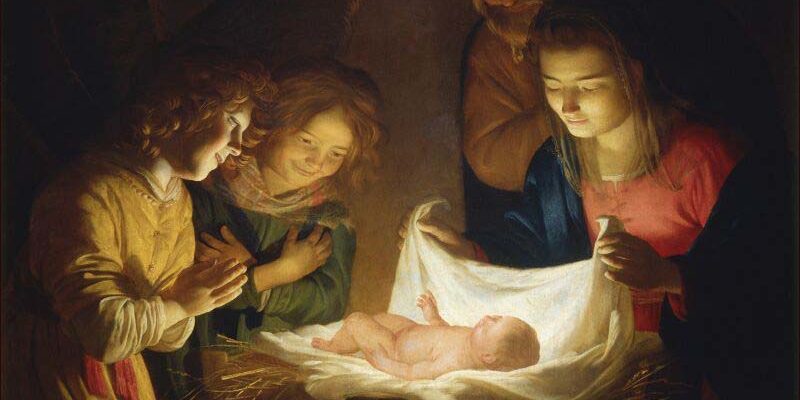
Taking the Trinitarian Christ out of Christmas
Who is Jesus? Few questions could be more relevant at Christmas.
Yet a new Lifeway Research study reports a statistic that has the potential to deflate the Christmas spirit. Only 41 percent of Americans believe the “Son of God existed before Jesus was born in Bethlehem.” That means 59 percent either do not believe or are unsure whether they believe that the Son of God existed prior to the Nativity.
As pastors prepare their Christmas sermons this year, they might want to keep this fact in mind. Many who will walk through their doors on Sunday morning—some Christians, some not—hold to a heretical understanding of the Trinity. They’ll listen to the sermons and sing the songs, but their view of God is not orthodox. To be blunt, their view of God is not Christian.
We are not the first to struggle with retaining a biblical view of the Trinity.
The Beauty of Eternal Generation
In the fourth century, a group within the church known as Arians also said there was a time when the Son was not. The popularity of this belief so threatened to rupture the unity of the church that our fathers gathered at Nicaea and Constantinople.
With the authority of the church universal, they declared, “We believe … in one Lord Jesus Christ, the only-begotten Son of God, begotten from the Father before all time, Light from Light, true God from true God, begotten not created, of the same essence as the Father, through Whom all things came into being.”Everything hinges on that one word, begotten. Click To Tweet
Everything hinges on that one word begotten. It distinguishes the Son from the Father—at the risk of stating the obvious, a son is a son because he is begotten by a father. However, that word begotten also guarantees the Son is equal with his Father. Unlike human begetting, this Son was eternally begotten by the Father.
Furthermore, he was eternally begotten from the Father’s divine essence. He is not from a different essence or a similar essence, both of which create hierarchy in the Trinity. Rather, as the author of Hebrews says, the Son is “the radiance of the glory of God and the exact imprint of his nature” (1:3, ESV).
This core concept of Christianity was confessed by the church universal for over 1,700 years. Even as late as the middle of the 20th century, C. S. Lewis devoted two chapters of Mere Christianity to eternal generation. Lewis thought this doctrine was that essential to what it meant to be a Trinitarian Christian.
Then Everything Changed
The depth of the change hit me recently when my family was celebrating Advent and I picked up the Baptist Hymnal to sing “O Come, All Ye Faithful.” Verse 2, which sings the Nicene Creed—confessing the Son as true God of true God, begotten, not made—was missing.How many Christians absorb Christmas carols that never teach them who Jesus is apart from a baby born in a manger? Click To Tweet
I was thankful the Trinity Hymnal was nearby, which I snagged just in time to recover verse 2. Yet as we sang, my mind was elsewhere: How many Christians absorb Christmas carols that never teach them who Jesus is apart from a baby born in a manger?
I’m afraid the absence of orthodox Trinitarianism is not accidental. In the late 20th century, evangelicals erased “begotten” language from their translations of the Bible—even John 3:16 no longer reads that God “gave his only begotten Son” but that God gave his “one and only” Son.
In academia, major textbooks in theology rejected the doctrine because evangelicals could not find a chapter and verse that spelled out its specifics or because it did not make sense to them. Theologians also replaced orthodox concepts like eternal generation with social categories, redefining the Son’s eternal unity with the Father as a societal relationship of cooperation.
Operating from a social Trinity, some evangelicals went so far as to subordinate the Son, inserting a functional hierarchy within the immanent life of God from eternity, as if the Father is a greater supremacy, glory, and authority than the Son.
These novel maneuvers reveal how far we have drifted from Trinitarian orthodoxy.
But There is Hope
Consider a few ways we can put the Trinitarian Christ back into Christmas.
To start, when we present the good news this Christmas, we must not leave the Trinity out. Without the Trinity, we have no gospel to celebrate. As I explain in Simply Trinity, if the Son is not the only begotten Son, then there is no basis on which the Father can send his Son into the world to save sinners like you and me.
Only one who is God himself, begotten from the very essence of the Father, is qualified let alone capable of saving a fallen humanity. If he is not the eternal Son—true God of true God—how can he grant us that greatest of Christmas gifts: life everlasting?
Next, remind those around you that the application of God’s amazing grace to us depends entirely on the Trinity. If Jesus is not a Son by nature, what hope do we have that we can become sons by grace?If Jesus is not a Son by nature, what hope do we have that we can become sons by grace? Click To Tweet
As his adopted sons, we have life in his eternal Son, and through him the Spirit communicates to us the Father’s benevolence. As recipients of his everlasting grace, as benefactors of his unceasing mercy, we cry out to him, “Abba, Father” (Gal. 4:6) with every confidence he will receive us as sons in his Son (Rom. 8:15).
Last, rather than resting content with a narrow focus on what Christ does, expand your vision to who Christ is. John’s gospel is exemplary: “In the beginning was the Word, and the Word was with God, and the Word was God. He was with God in the beginning. Through him all things were made; without him nothing was made that has been made” (1:1–3).
The apostle is eager to introduce the saving work of Christ, but before he does so, he lifts us outside the confines of history to contemplate who this Son is from eternity: the Word who was not only with God but also was God. Here is the true meaning of theology, that marvelous task of contemplating who God is in and of himself.
David once said he desired one thing alone: to “gaze on the beauty of the Lord” (Ps. 27:4). Our “blessed hope,” says Paul, is nothing less than the “appearing of the glory of our great God and Savior, Jesus Christ” (Titus 2:13).
But unless our Savior this Christmas is the “great God” himself, the one who descends into our darkness out of the glory of his everlasting light, we will never enjoy the blessedness and bliss of that beatific vision.

